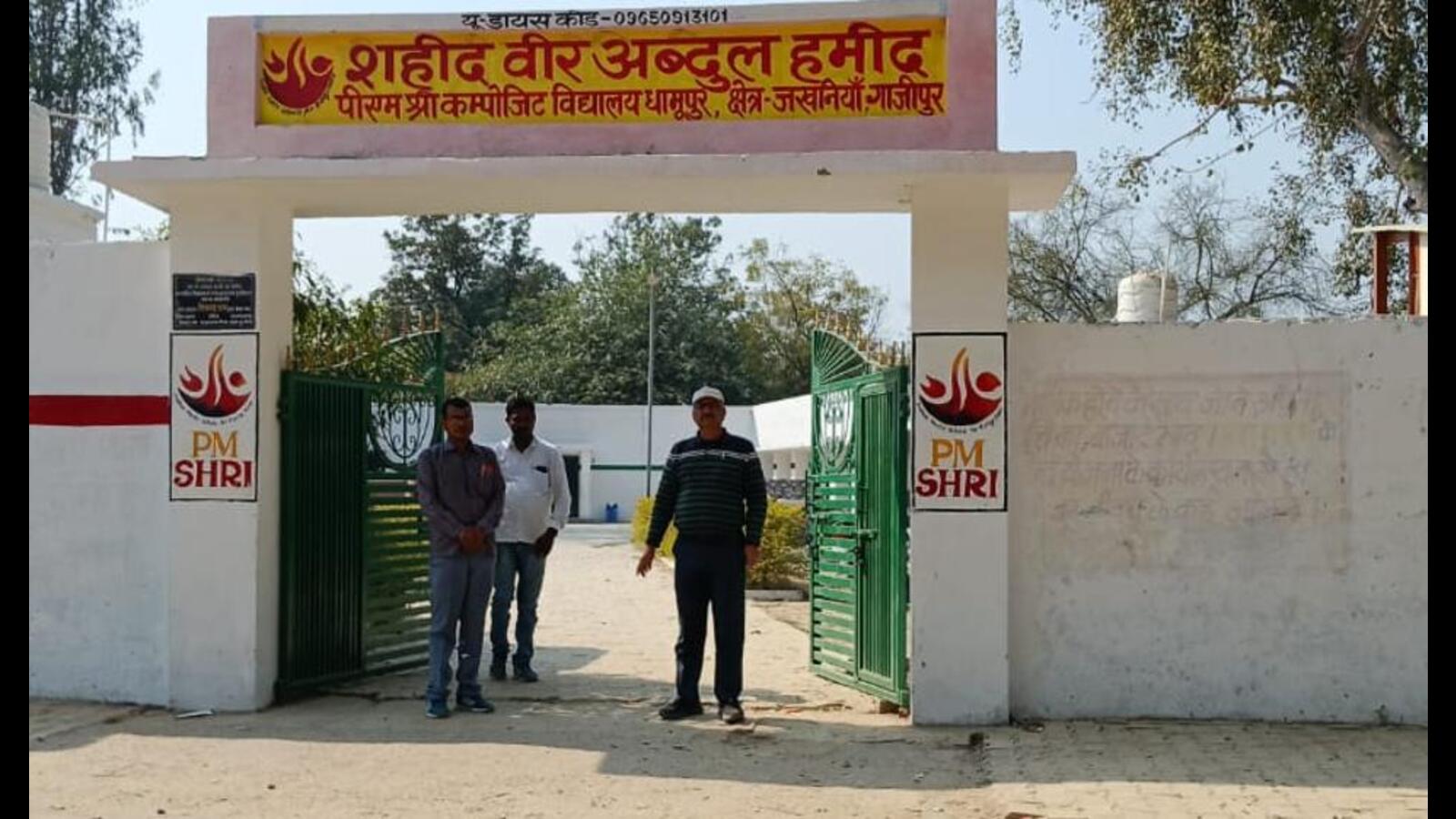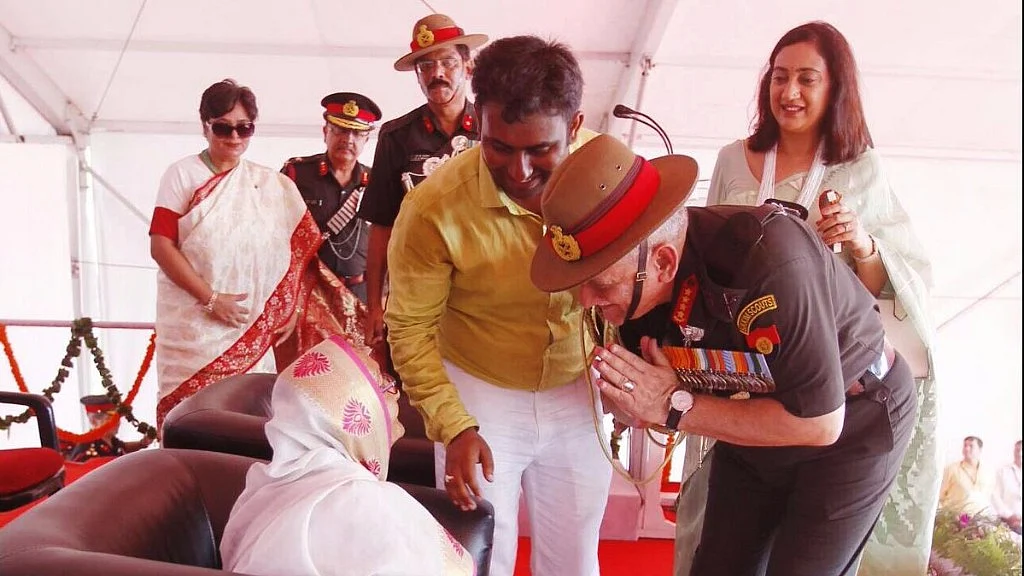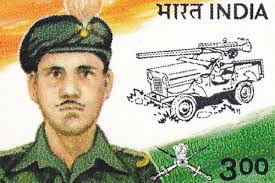
Faiyaz Ahmed Fyzie
In the fleeting time, some names do not just pass by but are inscribed in golden letters on the pages of history. They merge into the cycle of time as if they are the architects of history. One such name is Havaldar Veer Abdul Hamid , Param Vir Chakra. Veer Abdul Hamid is not just a name, a symbol of bravery, supreme sacrifice, and patriotism, and thus a source of inspiration.
Paramveer Abdul Hamid was born on July 1, 1933, in Dhampur village in Dilhapur town of the Ghazipur district of Uttar Pradesh to Muhammad Usman and Sakina Begum, a common indigenous backward family.
His ancestors and family members were cloth weavers for generations. His father was a tailor by profession. Young Hamid also often helped him by sewing clothes. However, something else was weaving in the mind of young Hamid ; he had a dream.
 Like other village children, he was also raised in an environment where he saw people sticking to traditional occupations like farming, weaving, and sewing. As a child, Hamid was courageous and not much interested in studies. His intelligence and sharp mind were more reflected in physical activities and practical work. His grandparents (including grandmom) were wrestlers and he also got interested in wrestling. He was famous as a teacher of Ghilil in the village and was known as a shooter. He was also a good swimmer and once famously saved the lives of two girls drowning in floodwaters.
Like other village children, he was also raised in an environment where he saw people sticking to traditional occupations like farming, weaving, and sewing. As a child, Hamid was courageous and not much interested in studies. His intelligence and sharp mind were more reflected in physical activities and practical work. His grandparents (including grandmom) were wrestlers and he also got interested in wrestling. He was famous as a teacher of Ghilil in the village and was known as a shooter. He was also a good swimmer and once famously saved the lives of two girls drowning in floodwaters.
Coming from a poor and oppressed backward society, he had a natural fearlessness and courage to fight against injustice. It is said that once he single-handedly fought against the village henchmen when they tried to harvest the crops of a poor backward farmer. These special qualities of Hamid in childhood gave him a distinct identity.
From childhood, discipline, hard work, and devotion to duty were deeply ingrained in him. These same qualities later helped define his extraordinary military career and make him a great soldier.
To make his dream and passion of joining the Indian Army a reality, he headed to Banaras. There he was commissioned into the 4th Battalion of the 4 Grenadiers Regiment at the age of 20, on 27 December 1954.
After joining the Indian Army, Abdul Hamid was posted in Amritsar, Jammu and Kashmir, Agra, Delhi, Ramgarh, and Arunachal Pradesh. During the Indo-China War of 1962, his battalion fought the Chinese People's Liberation Army in the Battle of Namka Cho.
Abdul Hamid was seriously injured in this clash, but his courage got better is his injury. He covered a distance of 14-15 kilometers on his knees and elbows and hoisted the tricolour on the border. His wife Rasool Bibi narrates the story how during the 1962 war, Hamid was lost in the forest and survived by eating leaves.
 A School named after Veer Abdul Hamid
A School named after Veer Abdul Hamid
After the initial successes of Operation Gibraltar in the 1965 war, the Pakistan Army, equipped with over 300 modern American M47 and M48 invincible Patton tanks, launched a major offensive to capture the city of Amritsar. The idea was to cut India's supply lines, and reach Delhi via Jalandhar.
The village of Asal Uthar near the Khem karan sector of the Tarn Taran district was the most important front of the war. The Indian Army, led by Major General Harbakhsh Singh and Brigadier Theograj, had deliberately retreated towards Asal Uthar as part of their strategy.On the night of September 8, 1965, the Pakistan Army launched a fierce attack in the areas around Khem Karan. At that time, Veer Abdul Hamid was posted as a Quartermaster Havaldar in his company. He had only a 106 mm recoilless rifle mounted on a jeep. He quietly hid in the fields and took over the front.

CDS General Bipin Rawat bowing to Rasoolan BIbi, wife of Martyr Veer Abdul Hamid
With amazing tact and courage, he single-handedly targeted the invincible American Patton tanks, which were equipped with powerful 90 mm main guns, modern armoured protection, fire control system, and excellent mobility, and destroyed eight Patton tanks, the pride of the Pakistan Army, one by one. This sudden counterattack caused panic in the Pakistani army.
They failed to figure out the source of the attack. But Havaldar Hamid was targeting the ninth tank, a shell fired by the enemy hit his jeep.
Thus, this great son of Bharat Mata, Tank Destroyer Abdul Hamid, was martyred. His courage gave both pride and victory to India. His bravery checked the Pakistani attack and inflicted heavy losses on its Army. Asl Uthar became a graveyard of Patton tanks and Pakistan was forced to retreat. His defeat broke their morale and the dream of reaching Delhi.

Thus, Veer Abdul Hamid, with his unparalleled bravery, courage, and supreme sacrifice, destroyed the arrogance of the aristocratic General Ayub Khan in which he had said "Insha Allah, I will offer the next Friday prayers in the Jama Masjid of Delhi."
Veer Abdul Hamid's performance played a significant role in India's victory in the 1965 war and also put an arrogant Army Chief in his place. His bravery during the operation was a glorious example not only for his unit but also for the entire division.
Veer Abdul Hamid's wife Rasool Bibi was also a brave woman. She was often considered the source of inspiration for Veer Abdul Hamid. She always encouraged her husband to serve the country. Inspired by her husband's intentions and thoughts, Rasool was filled with courage and determination to work hard. She was responsible for raising their four sons and a daughter. She taught the children to read and write and struggled to give them a good future. She also sent her two sons, Zainul Abideen and Talat, to the Indian Army, which was a testament to her patriotism and courage.
ALSO READ: Ghulam Nabi Tantray- a visionary educationist from Bandipora
Abdul Hamid is not just a Param Vir Chakra recipient, but a living symbol of social equality, inclusion, and nationalism. His name is etched in golden letters in history, which will continue to teach future generations that true bravery is not born of circumstances but of unwavering determination and love for the country.
( Dr. Faiyaz Ahmed Fyzie is translator, columnist, media panelist, marginalized-social activist and AYUSH physician )
